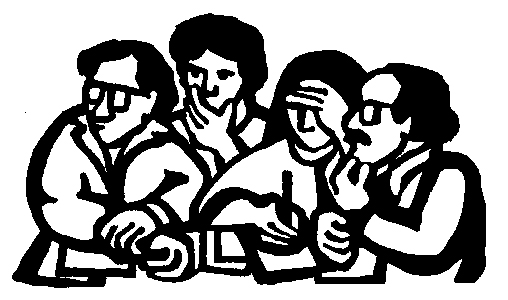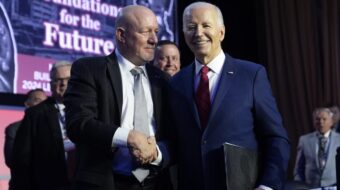
There is no question that there is a great deal of excitement in the labor movement about the candidacy of Bernie Sanders in the coming Democratic primary elections. Some 40 labor leaders met and greeted Sanders at an event yesterday at the headquarters of the American Postal Workers Union, an appropriate place for Sanders to be hosted considering his long battle to save postal and other public services threatened by right-wing lawmakers.
This week, on the other hand, the more than one million-member American Federation of Teachers endorsed former Secretary of State Hillary Clinton, highlighting her positions in favor of strong public education and strong teachers’ unions.
The AFL-CIO has withheld endorsing a candidate in the primaries for now, preferring to push instead on the issues it sees as critical not just to the labor movement but to workers in general – particularly trumpeting its “raising wages agenda,” since its adoption last winter.
All unions, including the AFT, have expressed satisfaction with many of the positions taken by Bernie Sanders, Hillary Clinton, and Martin O’Malley, three of the Democratic candidates. But, like the AFT, some unions will probably endorse one candidate or another meaning that the labor movement will not have a united front for the primary elections.
I do not think that any of this means the labor movement is hopelessly divided when it comes to the 2016 presidential elections. The evidence, in fact, is that the opposite is true, at least when it comes to the issues. There has been an unprecedented amount of unity around the AFL-CIO’s raising wages agenda, with almost the entire labor movement pushing the major candidates for the same thing.
In many ways the campaigns of the major Democratic candidates reflect the success of this approach by labor and its allies. It is interesting that in both Clinton’s and Sander’s cases so far, each has avoided attacking the other, vowing to stick to the issues as they see them.
Clinton gave a major speech on the economy this week during which she said wage stagnation is the result of policy choices. This has long been the position of the labor movement which, of course would add to the Clinton assessment that the policy choices were made by lawmakers beholden to the super-rich and acting against the interests of the majority.
Clinton, in her speech on the economy, also said that wage stagnation is “the core economic challenge” that must be overcome to boost middle-class (we say working class) incomes. Cynics will say that Hillary’s people can read labor movement press releases as well as anybody else but the labor movement itself cannot but be pleased that a major candidate who could win the Democratic nomination is taking this position. There are 20 Republican candidates, one or another of whom could end up as president, that are calling for elimination of minimum wage laws altogether. All of the GOP hopefuls oppose expansion of collective bargaining rights and almost anything else that is helpful to workers.
Bernie Sanders, of course, has been campaigning hard for an end to the wage gap, and for higher minimum wages and a host of other progressive positions favored by the labor movement.
I believe that by joining with its allies this year and getting behind a raising wages campaign, the nation’s unions have been able to successfully push the major candidates, including Hillary Clinton, to address some of their issues.
Labor ‘s task during the lead up to this election, more than locking itself into either the Clinton or Sanders campaign, is to push on the major issues. The first of these is the continuing fight to raise the minimum wage.
Second, there needs to be major support for the administration’s efforts to update overtime rules. The Obama plan would expand overtime protection to 13.5 million people. It should be extended to everyone who works overtime.
Sanders and Clinton both have said they support collective bargaining rights. The goal is to get them to become more and more specific on this point and to expose Republicans who oppose these rights as the national disgrace that they are.
Labor has told the candidates that undocumented workers must have a path to citizenship but even before that measures are needed to allow them to work legally and guarantee them the rights of all workers. A raising wages agenda, the labor movement says, will not succeed unless this is done. We need presidential candidates who will say this, not candidates like Trump who slander immigrants.
Both the Clinton and Sanders campaigns need to be more specific on the issues of race and gender discrimination. Such discrimination, and the institutionalized racism that leads to police crime and mass incarceration militate against the carrying out of a raising wages agenda.
The labor movement is pushing all the candidates, Clinton and Sanders included, to come out with stronger proposals on enforcement of labor standards.
The Federal Reserve system is charged with developing monetary policy that promotes full employment. It is the role of the labor movement and progressives generally to press the candidates on this issue too. Monetary policy should aim for full employment, not just for full pockets on Wall Street.
Labor has long been pushing for massive programs to rebuild infrastructure and create jobs. Clinton and Sanders both have supported this but are being pushed by labor and its allies to back infrastructure programs that target areas and groups hit hardest by unemployment, particularly minority communities.
Sanders has been good on opposing trade deals that hurt workers. The labor movement can be expected to continue to push Clinton to take stronger positions in this area.
Both of them call for fairer tax codes. The labor movement can be expected to push its longtime agenda here too – the ending of tax shelters and havens and laws that allow the super rich to pay far lower percentages of their income than the percentages paid by the working class majority.
It’s fine to back a candidate who takes good positions and has a good record. But it would be a mistake to take a do or die approach to any particular single candidate at this time – a mistake to say “if my candidate doesn’t win the primary, I’m staying home.”
When it comes to the 2016 presidential elections labor’s approach of focusing on the issues seems to be paying off. Americans are taking candidates like Clinton and Sanders seriously. The Republican cabal is looking more and more like a circus.
Image: Rini Art

MOST POPULAR TODAY

Ohio: Franklin County treasurer attends Netanyahu meeting, steps up Israel Bond purchases

After months of denial, U.S. admits to running Ukraine biolabs

Hold the communism, please: SFMOMA’s Diego Rivera exhibit downplays artist’s radical politics

“Trail of Tears Walk” commemorates Native Americans’ forced removal

‘Warning! This product supports genocide’: Michigan group aims to educate consumers






Comments